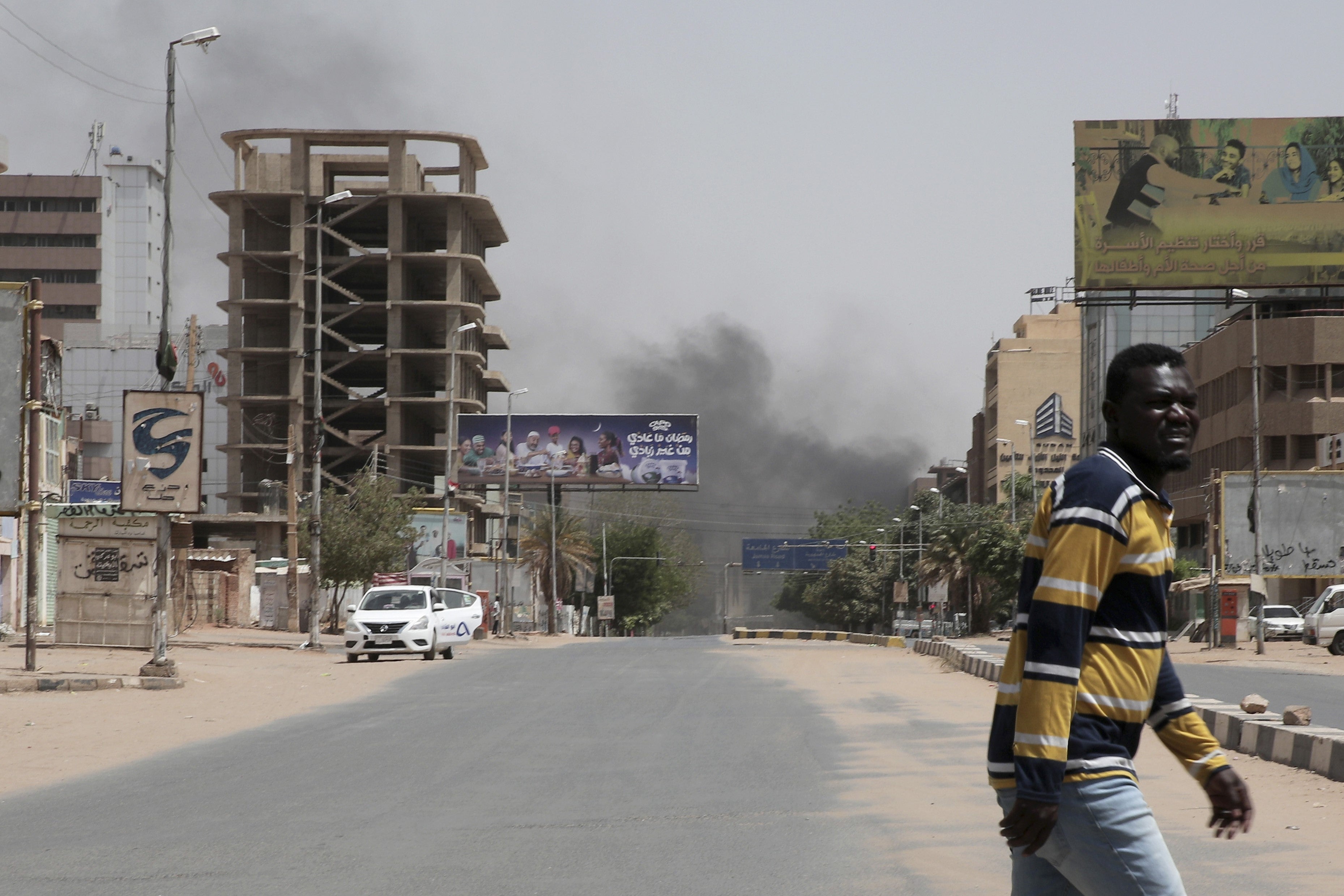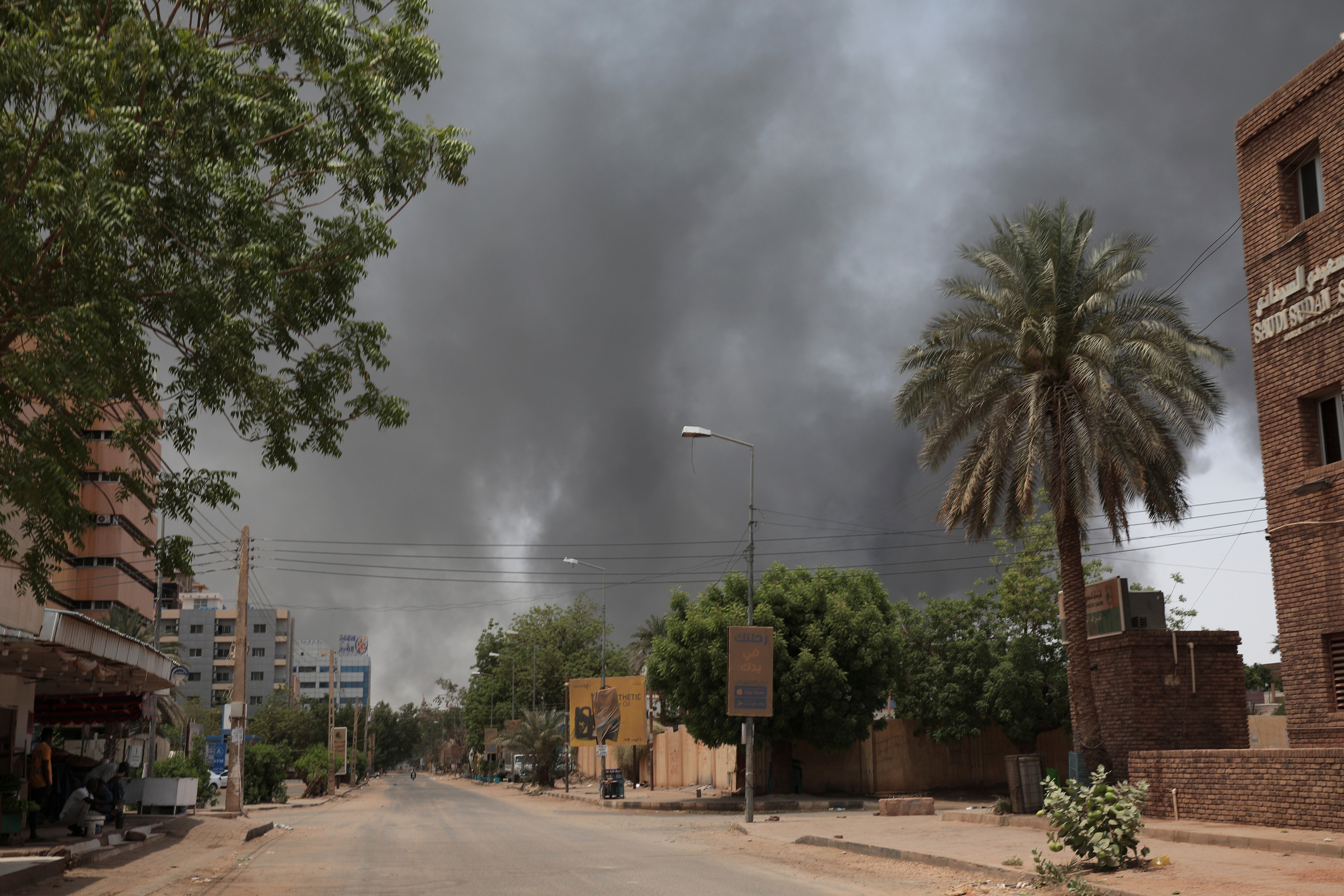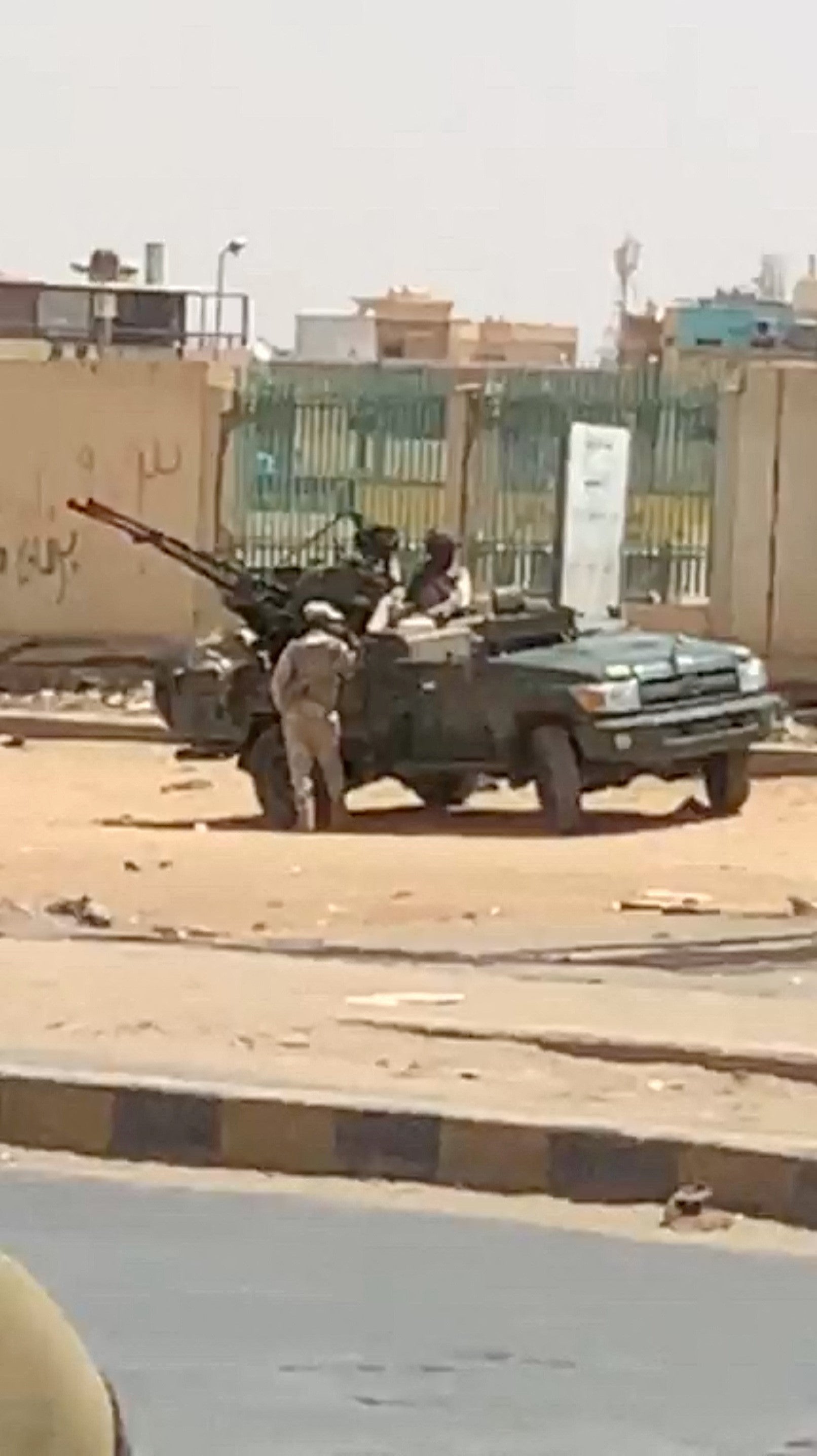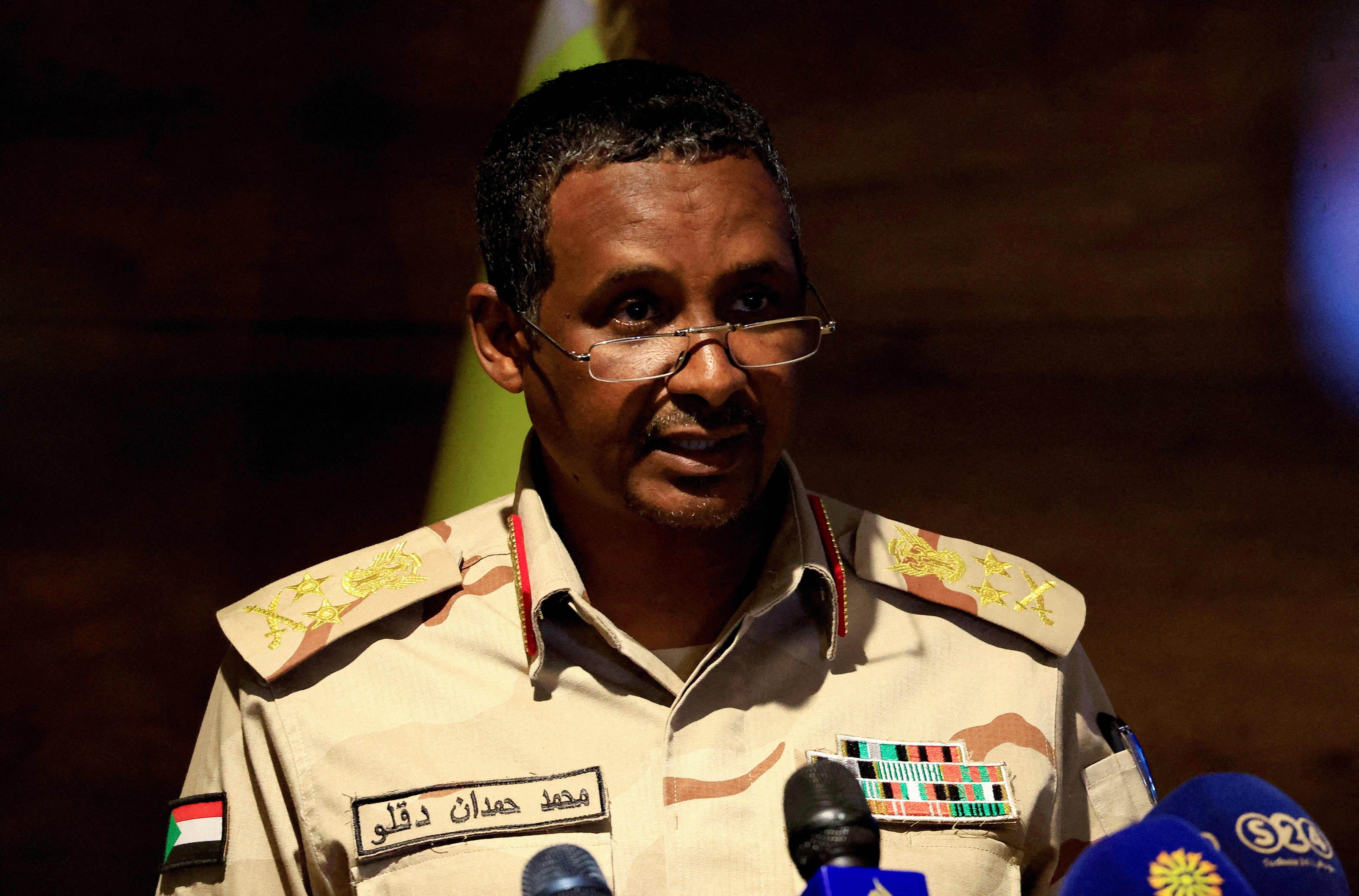Dozens dead and hundreds injured as fighting in Sudan power struggle enters second day
Senior official said international community had failed to act on growing tensions between two sides

Your support helps us to tell the story
From reproductive rights to climate change to Big Tech, The Independent is on the ground when the story is developing. Whether it's investigating the financials of Elon Musk's pro-Trump PAC or producing our latest documentary, 'The A Word', which shines a light on the American women fighting for reproductive rights, we know how important it is to parse out the facts from the messaging.
At such a critical moment in US history, we need reporters on the ground. Your donation allows us to keep sending journalists to speak to both sides of the story.
The Independent is trusted by Americans across the entire political spectrum. And unlike many other quality news outlets, we choose not to lock Americans out of our reporting and analysis with paywalls. We believe quality journalism should be available to everyone, paid for by those who can afford it.
Your support makes all the difference.Dozens of people have been killed and hundreds injured as the fighting in Sudan between the country’s military and powerful paramilitary enters its second day.
Fierce battles erupted in the Sudanese capital Khartoum and other areas early on Saturday, with the Sudan armed forces and Rapid Support Forces (RSF) blaming the other for initiating the violence. A doctors’ syndicate said early on Sunday the death toll had risen to 56, with at least 595 people wounded.
One official with deep knowledge of the situation told The Independent that the international community had failed to act on escalating tensions between the generals. The violence will spark fears of a wider conflict in the chaos-stricken country, which is already dealing with economic breakdown and flare-ups of tribal violence.

Months of heightened tensions between the two sides had delayed a deal with political parties to get the country back to its short-lived transition to democracy, which was derailed by an October 2021 military coup.
Chaotic scenes unfolded in the capital of Khartoum, where fighters firing from truck-mounted machine guns battled in densely populated neighbourhoods.
Residents of Khartoum told The Independent gunfire first echoed through the capital at 6am local time and plumes of smoke were rising above parts of the city.
“In my neighbourhood, RSF forces came in this morning on land cruisers with small and heavy arms,” Ahmed, 48 told The Independent from a northern part of the capital, as gunfire crackled in the background.
“They are still here now and seem like they are on standby for something. No civilians are moving - everyone is taking shelter inside the streets are empty. My 7-year-old son heard the bombing and was crying begging me not to go outside.”
He said earlier he saw Sudanese army fighter jets roar above the buildings and heard explosions, with reports RSF camps in other parts of the city had been the target.

“Everyone is extremely worried about what is going to happen. But it feels like [RSF] forces are not stable,” he added.
“Khartoum is not Darfur – Hemedti [RSF’s chief] might be able to control some areas outside the capital but his forces don’t know these streets well.”
By the end of the day, the military issued a statement ruling out negotiations with the RSF, instead calling for the dismantling of what it called a "rebellious militia." The head of the paramilitary group, in turn, branded the armed forces chief a "criminal." The tough language signaled that the conflict between the former allies, who jointly orchestrated the 2021 coup, was likely to continue.
Meanwhile, diplomatic pressure appeared to be mounting. Top diplomats, including the US Secretary of State, the UN secretary-general, the EU foreign policy chief, the head of the Arab League and the head of the African Union Commission urged the sides to stop fighting.

Arab states with stakes in Sudan — Qatar, Egypt, Saudi Arabia and the United Arab Emirates — also called for a cease-fire and for both parties to return to negotiations.
US Secretary of State Antony Blinken said he consulted with the foreign ministers of Saudi Arabia and the United Arab Emirates. "We agreed it was essential for the parties to immediately end hostilities without pre-condition," he said in a statement early Sunday.
The British embassy told British nationals to stay indoors, as officials closely monitored the situation.
A senior United Nations official told The Independent tensions between the Sudanese army and the RSF had been simmering for a while and that the international community had failed to act.
The UN official added in the last week there were many “SOS and May Day calls” made to the US State Department about the gravity of the impending crisis “but they were ignored”.

“The international community failed to address the largest elephants in the room,” the UN official said.
“Number one was how do you convince Hemedti to relinquish his army and stay alive and have a future in Sudan?”

Problem number two related to the political framework agreement that was designed to facilitate the nation’s turbulent transition to civilian rule, the official added.
Hemedti, the billionaire militiamen with ties to the country’s gold mines, leads the RSF which was accused of raping and killing protesters in Khartoum in 2019 and committing genocidal violence in Darfur (accusations he denies). He currently holds the position of deputy head of Sudan’s ruling Sovereign Council while still commanding his forces which analysts say number as many 100,000.
The UN official said the international community had failed to come up with a “landing zone” for Hemedti.
The other source of the crisis is the political framework agreement.
The official said International negotiators - including the U.S., Norway and the U.S. were “pushing this framework agreement very hard they ignored [General Abdel Fattah] al-Burhan who had said they needed to open framework agreement as it is not representative enough.”
“There was an arrogance - they said they would sanction individuals who were blocking the transition.”
The Sudan Doctor's Syndicate said at least six of the deaths were reported in the capital Khartoum and its sister city Omdurman and another eight near Nyala, the capital city of the South Darfur province in the southwest.
The syndicate said the casualty toll was likely higher, with many believed to be still uncounted in western Darfur region and the northern town of Merowe.
The military said in a statement late Saturday that its troops had seized all RSF bases in Omdurman, while residents reported heavy airstrikes on paramilitary positions in and around the capital that continued into the night. After nightfall, sounds of gunfire and explosions were still heard in several parts of Khartoum, they said.
Earlier on Saturday, Sudan's paramilitary RSF said they had taken control of the presidential palace, the residence of the army chief, and Khartoum international airport in an apparent coup attempt. The RSF also said they had seized the airports in the northern city of Merowe and in El-Obeid in the west. The military dismissed the claims as “lies.”



Join our commenting forum
Join thought-provoking conversations, follow other Independent readers and see their replies
Comments